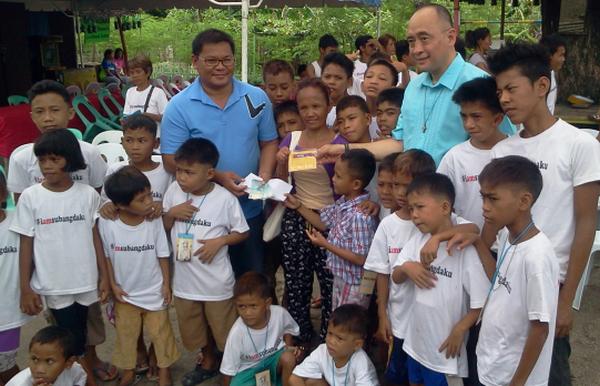
Fr. Carmelo Diola turns over a bankbook to Daniel Cabrera (in checkered polo shirt). Fr. Diola also hands over to barangay captain Ernie Manatad a P100,000 check for 10 street children. (CDN PHOTO/ NORMAN MENDOZA)
Nine-year-old Daniel Cabrera has a new home in Mandaue City, a rented room sponsored by a donor.
At least 10 other street children in barangay Subangdaku will also get a share of the donations from 10 foreign countries originally raised for the education and future of Daniel.
A photo of Daniel studying under the light of a McDonald’s parking lot went viral after it was posted online in late June.
The image has moved many donors, foreign and local, to reach out to help Daniel improve his life.
Cash donations have reached P200,000. Some donors have even pledged monthly funds for Daniel, said Fr. Carmelo Diola of Dilaab Foundation and coordinator of Ugnayan sa Barangay at Simbahan (Ubas), who is overseeing the funds.
READ: Over P220,000 raised for Daniel’s education
Givers came from organizations and individuals in Czechoslovakia, the United Kingdom, the United States, and Dubai, among others.
Fr. Diola said he asked permission from the donors to share some of the blessing with other street children after he explained to them that Daniel was just one of many street kids who need attention.
Daniel’s family has moved into a new rented room in sitio Malibu, barangay Subangdaku.
Daniel works on his homework inside his family’s new rented room in sitio Malibu, barangay Subangdaku, Mandaue City. (CDN PHOTO/ TONEE DESPOJO)
Fr. Diola blessed the modest room, whose monthly rent was pledged by an anonymous donor.
Another donor gave a trisikad for his mother’s livelihood. It can also be used to transport the boy to and from school.
Daniel also has a bank account facilitated by Fr. Diola with initial savings of P5,000 to to be used only for his schooling.
Last Sunday, Fr. Diola turned over the bankbook to Daniel and a P10,000 check to Subangdaku barangay captain Ernie Manatad. The amount will be shared by 10 street children, whose parents committed to support and send these kids to school.
Manatad will choose the 10 street children who will share the cash aid.
Manatad said the money will be used for the daily allowances of the children.
Barangay officials will help monitor their progress in school.
Manatad also has a group of 40 street children whom he and other barangay officials meet and care for every Sunday. They have been keeping tabs with street kids since 2011.
The group started with 28 street kids in 2011 and has grown to 40.
“Some of them no longer have parents. They just sleep on the sidewalks and begged for food. Some are forced by their parents to help them find money,” he said.
During Sunday gatherings, the volunteers bathe the children, provide slippers and a clean shirt, cut their hair and nails, and check on their health.
The expenses are taken from a collection of donations of P1,500 to P2,000 weekly.
When Daniel’s case went viral on the Internet, Manatad has also been contacted by several good Samaritans who wanted to make a donation.
Manatad said he felt awkward handling the donations so he sought the aid of Fr. Diola, who responded and organized the channeling of donations.
Fr. Diola said other barangays can follow this system in order to ensure a better future for street children and to ensure they don’t fall into bad company and become a problem for the community.
“Sustainability is not a problem because God has the bounty. It needs only the efforts of barangay officials,” he said.
Diola said if barangays have this kind of project for street children, the government would not have to rescue the kids or round them up to keep them out of public view of visitors during beautification campaigns for occasions like the upcoming Asia-Pacific Economic Cooperation (APEC) meetings.
READ: Massive roundup of Cebu city mendicants comes ahead of APEC | Cops to ask social workers to join roundup of minors